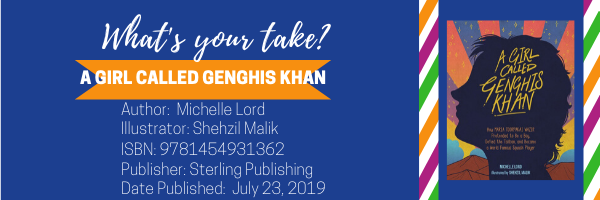by Seemi Aziz, University of Arizona, Tucson, and Celeste Trimble, St. Martin’s University, Lacey, WA
Abilities and disabilities go hand in hand and their representations in children’s picturebooks know no bounds, especially in recent publications. Success stories depicted in picturebooks provides inspiration for readers of all ages. For the month of January 2020, Seemi and Celeste provide their takes on the power of strengths and abilities especially those of little-known athletes of local and global origins. This week, they look at A Girl Called Genghis Khan: How Maria Toorpakai Wazir pretended to be a Boy, Defied the Taliban, and became a World-Famous Squash Player, written by Michelle Lord and illustrated by Shehzil Malik.

SEEMI: Maria Toorpakai Wazir, is a Pakistani girl who loved sports and longed for the freedom that boys enjoyed. She joined a squash club to pursue her dream and was pushed back by the culture but still continued playing. Maria received an award from the President of Pakistan for outstanding achievement, which brought her to the limelight and her squash club, life and family were threatened by Taliban. She was forced to quit the team but refused to give up. Maria kept practicing the game in her bedroom every day for three years! Her hard work and perseverance do pay off in the end in a western nation of Canada where she relocates. This seems to be a picturebook biography of squash player Maria Toorpakai Wazir of Pakistan. The book does include some bibliographical references.
What I appreciate is Maria’s story to be told to the world. What I did not appreciate is the reinforcement of the same stereotype that frames most women belonging to Pakistan initiated by Malala Yusafzai’s story. Even though this book speaks to the overall theme of abilities and perseverance, it does not do justice to the culture that exists in majority Pakistan where Muslim women have more rights than any other Muslim country. Further, the caricatured images in the book take away from the story itself. I especially did NOT appreciate the following statement by the publishers due to the above-mentioned reasons:
“This compelling, timely, and empowering picture book introduces children to Maria Toorpakai Wazir, a Pakistani girl who braved threats from the Taliban in order to play the sport she loved.”
CELESTE: As I read this book, I was uncomfortable a few times, especially on a page with an illustration of a woman in a burqa. The illustrated text surrounding the woman says (in red), “In public, women must be covered head-to-toe in a burqa,” (then in black), “with only a mesh covering in front to see through. They must not wear shoes that make noise while they walk.” Growing up in the United States, I thought that Muslim head coverings and other attire were forced upon women who did not want to wear them. As I grew, and especially as I read children’s literature that shed a different light on Muslim women, from their own perspective, I saw that many women see hijab and other Muslim attire as empowering. When I read this page, I cringed because it assumes that no women want to wear the burqa. It reinforces a stereotype of disempowered Muslim women who we need to work to dismantle, even at the same time as telling a story of a very empowered young woman. The problem is that it sets up the dichotomy that women in burqas are disempowered and women who cut their hair and pass as men are empowered.
When I read this, also, I began to wonder about the author’s perspective as a cultural outsider or insider. I learned that the author, Michelle Lord, is a cultural outsider and the illustrator, Shehzil Malik, is Pakistani. As a white reader and writer, I am conscious of #ownvoices in literature. When an #ownvoices author or illustrator is a creator of a book that has problematic elements, it complicates things for me as a reviewer. #Ownvoices does not necessarily mean without issue.
With these things in mind, I had never heard of Maria Toorpakai Wazir before, and I am eager to learn more! Also, squash is a sport that I know almost nothing about. This is a book that could enrich understandings of global sports, but I do worry about the stereotypical elements. It doesn’t look like there are any other children’s books about Maria Toorpakai Wazir, and I don’t see any children’s books at all about the sport Squash available in the United States. This book would be the only book kids in the U.S. would encounter about Maria or squash. There’s a lot of responsibility in that.
SEEMI: Yes, even the illustrator (a cultural insider of sorts) reinforces multiple stereotypes about Muslims, Muslim women and Islam through the cartoon-like images. The author of course, being outside the culture, makes the culture either black or white missing the multiple grey shades that are relevant when representing a certain culture that is not their own.
Conclusions: While looking at several athletes that projected multiple cultures, we came away with the fact that abilities transcend regions and sociocultural influences, and anything can be achieved if a person puts their mind and physical effort into it. The stories are inspirational and need further reading and research in each as some were well-documented while others were not.
Title: A Girl Called Genghis Khan: How Maria Toorpakai Wazir pretended to be a Boy, Defied the Taliban, and became a World-Famous Squash Player
Author: Michelle Lord
Illustrator: Shehzil Malik
ISBN: 9781454931362
Publisher: Sterling Publishing
PubDate: July 23, 2019
Reviews and Awards
Booklist, 09/01/19
Throughout January 2020, Seemi and Celeste give their take on books focused on youth taking action. Check back each Wednesday to follow the conversation!
- Themes: Celeste Trimble, Girl Called Genghis Khan, Michelle Lord, Seemi Aziz, Shehzil Malik
- Descriptors: Books & Resources, My Take/Your Take
